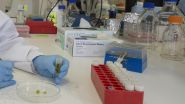(Press-News.org) Strategies to support healthier diets among seniors need to take into account differences between elderly men and women, according to UBC research.
The two groups had varying responses to a tactic thought to boost seniors' fruit and vegetable intake, according to a study published in Appetite.
The study explored which types of social support encouraged seniors to boost their daily intake of fruits and vegetables.
Social support, typically provided by friends and family, comes in different forms. It ranges from emotional support, which bolsters one's sense of self, to tangible support, which offers assistance with daily tasks such as shopping and cooking.
Researchers found women responded positively to emotional support, but that wasn't the case for tangible support.
"This may mean that emotional support is encouraging women to cook for themselves, and that the meals they prepare contain more fruits and veggies than those made for them," said Emily Rugel, the study's lead author and a PhD candidate at UBC's School of Population and Public Health.
A guideline of five servings per day has been linked to a range of health benefits, including lower rates of stroke, cancer, depression and dementia. However, less than half of Canadians aged 65 and older meet the five-a-day guideline.
"We should focus on strengthening social support as one way of ensuring that older adults eat enough fruit and vegetables," said Rugel. "But we really need to take gender differences into account as part of this process."
Men did not respond significantly to the different types of social support examined in the study.
"This means that there's an opportunity that we're missing: to encourage or provide friends and family members of older adults with the tools they need," she noted.
Canada's elderly population is on the rise. As of 2012, adults 65 and older made up roughly 15 per cent of the population, and they are expected to account for more than 25 per cent of the population by 2036.
Rugel recommends education campaigns stressing the importance of the five-a-day guideline to those who care for seniors, as well as increased access to free or low-cost produce for care providers.
BACKGROUND
The study, "Gender differences in the roles for social support in ensuring adequate fruit and vegetable consumption among older adult Canadians," is published in Appetite. Rugel's co-author, Richard Carpiano, is a professor in UBC's department of sociology.
Findings were based on surveys conducted with 14,221 Canadians aged 65 and over; 55 per cent of the respondents were women and 45 per cent were men.
The study divided social support into two categories: tangible and emotional/informational. Tangible support refers to assisting with tasks such as shopping and cooking. Emotional/informational support refers to efforts that help bolster one's sense of importance and ability to tackle tasks such as cooking, along with actions such as providing recipes and suggestions for meal preparation.
INFORMATION:
One of the most important things to understand in battery technology is the precise physical and chemical processes that occur at the electrode/electrolyte interface. However, microscopic understanding of these processes is quite limited due to a lack of suitable probing techniques. Now, researchers at the US Department of Energy's (DOE) Lawrence Berkeley National Laboratory (Berkeley Lab) and the University of California, Berkeley, have developed a new technique that enables sensitive and specific detection of molecules at the electrode/electrolyte interface.
This new ...
Ann Arbor, MI, July 8, 2015 - Nearly 800,000 people in the U.S. suffer a stroke each year. Stroke is responsible for one out of every 19 deaths in the U.S. and it is a leading cause of disability. A new study published in the American Journal of Preventive Medicine found that secondhand smoke (SHS) increases the risk of stroke by about 30 percent for nonsmokers.
Using data from the Reasons for Geographic and Racial Differences in Stroke (REGARDS) study, a national, population-based, longitudinal study investigating cardiovascular disease events and mortality endpoints ...
New York, 9 July - Investing up to 3.5% of a nation's GDP in science, technology and innovation - including basic science and education - is a key benchmark for advancing sustainable development effectively, leading experts say.
In papers released July 9 in New York, international scientists advising UN Secretary-General Ban Ki-moon say closing the gap between developed and developing countries depends on first closing international science, technology and innovation (STI) investment gaps.
According to the UN SG's 26-member Scientific Advisory Board: "While a target ...
Scientific journals should insist on more robust experimental processes, say biologists after reviewing nearly 900,000 experiments.
The team found that non-blind experiments - that is, where scientists knew which samples they were recording - averaged a 27 per cent stronger result than blind trials.
However their review suggests that less than one in four experiments used blind data recording.
"We found that non-blind papers tended to exaggerate differences between the experimental group and the control group," said lead researcher Dr Luke Holman, from the Research ...
Long-time smokers and past smokers now have a more accurate way of detecting whether or not they have lung cancer thanks to a comprehensive lung cancer screening program that uses CT scan technology at Intermountain Medical Center in Salt Lake City.
The program is based on the findings of the National Lung Screening Trial, a study that compared CT scans and standard chest X-rays in detecting lung cancer. CT scans use X-rays to obtain a multiple-image scan of the entire chest, while a standard chest X-ray produces a single image of the whole chest.
Results from the study ...
An international team of researchers has discovered how legumes are able to tell helpful and harmful invading bacteria apart. The research has implications for improving the understanding of how other plants, animals and humans interact with bacteria in their environment and defend themselves against hostile infections. These findings can have profound implications for both agricultural research and medical science.
Their study, which changes the understanding of carbohydrates as signal molecules, is newly published in the leading international journal Nature.
Legumes ...
ORLANDO, FL - An athlete's use of silicone ankle sleeves (SAS) and lace-up ankle braces (LAB) during sports participation can improve neuromuscular control, according to research presented today at the American Orthopaedic Society for Sports Medicine's (AOSSM) Annual Meeting in Orlando, FL.
"Athletes often use prophylactic sleeves or braces, and this study used markerless motion analysis to determine whether these support aids are beneficial," said lead author Seth L. Sherman, MD, from the University of Missouri - Columbia Department of Orthopaedic Surgery.
The study ...
ORLANDO, FL - Surgeons making reconstruction choices for an injured ACL can consider both bone-tendon-bone grafts and hamstring autografts as equally viable options in regards to healing, as reported in research today at the American Orthopaedic Society for Sports Medicine's (AOSSM) Annual Meeting in Orlando, FL.
"We compared the graft-tunnel motion of patients receiving either kind of graft, and noted both groups had similar graft motion at six weeks and one year from surgery, both ranged between 1-2 mm," commented Justin W. Arner, MD, from the University of Pittsburgh ...
A new study by UCLA scientists adds to the understanding of the genetic architecture of schizophrenia.
Past research has shown the impact of commonly occurring genetic variants on a person's risk of developing schizophrenia. This new study focused instead on rare coding mutations that affect protein function. It found that patients with schizophrenia have a higher-than-normal share of these mutations.
"While we cannot point to specific mutations that play a causal role in schizophrenia, we show that schizophrenia patients collectively have more of these mutations than ...
More than a third of overweight or obese teenagers don't see themselves as being too heavy and think their weight is about right, according to a Cancer Research UK study published today in the International Journal of Obesity.
The study* used data from around 5,000 13-15-year-olds who were asked about their weight and if they thought they were too heavy, about right or too light.
Researchers then checked their answers against their Body Mass Index (BMI)** -- to see whether the reality matched the teenagers' perceptions of themselves.
Almost three-quarters (73 per ...


